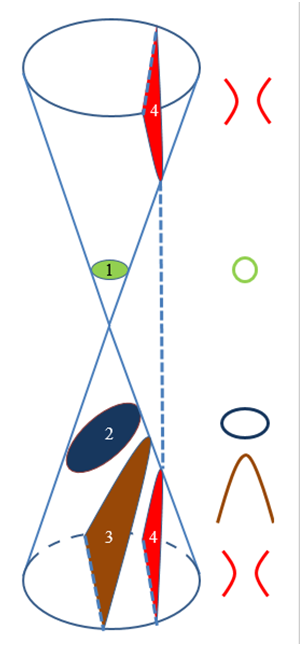 There are other ways of breaking words besides the ones we have so far dealt with: metanalysis, aphaeresis, aphesis, and apocope.
There are other ways of breaking words besides the ones we have so far dealt with: metanalysis, aphaeresis, aphesis, and apocope.
Take, for example, ellipsis (Greek ἔλλειψις), which means coming short. The explanation is coming shortly. It starts with some deceptively simple geometry, originally studied by Greek mathematicians, such as Menaichmos, Euclid, and Archimedes, but really put on the map by Apollonius of Perga (c. 262–190 BC)—conic sections (figure). The ellipse, formed by the transection of a plane across the cone at an angle that is aslant to the base, was so called because it fell short of cutting the base, unlike the parabola and the hyperbola.
 Figure: The four conic sections, produced when planes at different inclinations transect a cone:
Figure: The four conic sections, produced when planes at different inclinations transect a cone:
1. A circle, produced when the transecting plane is parallel to the base of the cone
2. An ellipse, produced when the transecting plane is at an angle to the base but does not cut it
3. A parabola, produced when the transecting plane is at a greater angle, so as to meet the base, but not at so great an angle that if extended upwards it would transect an inverted upper cone standing on the tip of the lower cone
4. A hyperbola, produced when the transecting plane is at right angles to the base and when extended upwards transects the upper cone
Strictly speaking, the bases of the cones illustrated here do not exist; the cones reach to infinity, as do the arms of the parabola and the hyperbola.
Each of these constructs, hyperbola, parabola, and ellipse, has a grammatical counterpart, hyperbole, parable, and ellipsis. Ellipsis, grammatical coming short, is defined in the Oxford English Dictionary as “the omission of one or more words in a sentence, which would be needed to complete the grammatical construction or fully to express the sense…”. The three dots form an ellipsis, since they show that I have missed something out—the rest of the definition. However, the definition is surprisingly deficient. Other sources confirm that ellipsis can be applied to the omission of any linguistic element, not merely words.
In his 1914 poem The Motor Bus, commemorating the introduction of motorized buses in Oxford, Alfred Godley played upon the aphaeresis of the Latin ablative “omnibus” into “bus”, which he then declined as a nominative: bus/be/bum/bi/bo/bo/bi/bi/bos/borum/bis/bis. Here is an extract: “What is this that roareth thus? / Can it be a Motor Bus? / Yes, the smell and hideous hum / Indicat Motorem Bum! / Implet in the Corn and High / Terror me Motoris Bi: […] Domine, defende nos/ Contra hos Motores Bos!” “Corn” and “High” are ellipses, in which the word “street” has been omitted from Cornmarket Street and High Street, the former also elliptically missing its market, which in any case no longer exists. The bracketed dots that I have inserted form an ellipsis marking the omission of 12 lines of the poem.
Like streets, eponymous diseases and syndromes are often subject to ellipsis. Why refer to Down’s syndrome and Cushing’s syndrome when you can call them “Down’s” and “Cushing’s”? Or Parkinson’s disease and Alzheimer’s disease, when you can call them “Parkinson’s” and “Alzheimer’s”? Other examples include a Meckel’s (diverticulum), the Barthell (score), and a Whipple’s (operation).
A common form of ellipsis is the insertion of a symbol to indicate a missing letter or letters in a word. Apostrophe was originally the omission (i.e. ellipsis) of one or more letters in a word; it now means the sign used to indicate it, as in it’s (it is), he’d (he had/would), and she’ll (she will). Asterisks are often used to replace letters in taboo words, such as *hit, *uck, and *unt, although why “whit”, “puck”, and “aunt” should be considered taboo beats me.
Writing in The BMJ a few years ago, I suggested that there are no exact synonyms for incest, no euphemisms, no slang terms. A few correspondents wrote to suggest “mother-fucking” and “mother-fucker”. However, I know of no instance of the word mother-fucker, or any of its derivatives or euphemistic equivalents (mf, mo-fo, mother-humper, mother-plugger, futher-mucker, mammy-jammer), in which it is actually used as slang for one who is known to have committed incest. It is always used pejoratively, or (perversely) to describe someone exceptional, often with a hint of envy, or simply as a general greeting between friends. In these senses, it can be used to describe a man or a woman. It can also be used to describe circumstances and inanimate objects (both positively and negatively). As an insult it carries much more weight if the implied accusation is false, as it usually is.
We don’t mind the full spellings of these words any more. Consider, for instance, Stephen Adly Guirgis’s play about drugs addicts, currently showing in London, The Motherfucker With the Hat (2011). But some may still be sensitive about this. To them I apologise. Perhaps I should have used the elliptical form instead—m****r-fucker.
Jeffrey Aronson is a clinical pharmacologist, working in the Centre for Evidence Based Medicine in Oxford’s Nuffield Department of Primary Care Health Sciences. He is also president emeritus of the British Pharmacological Society.
Competing interests: None declared.
